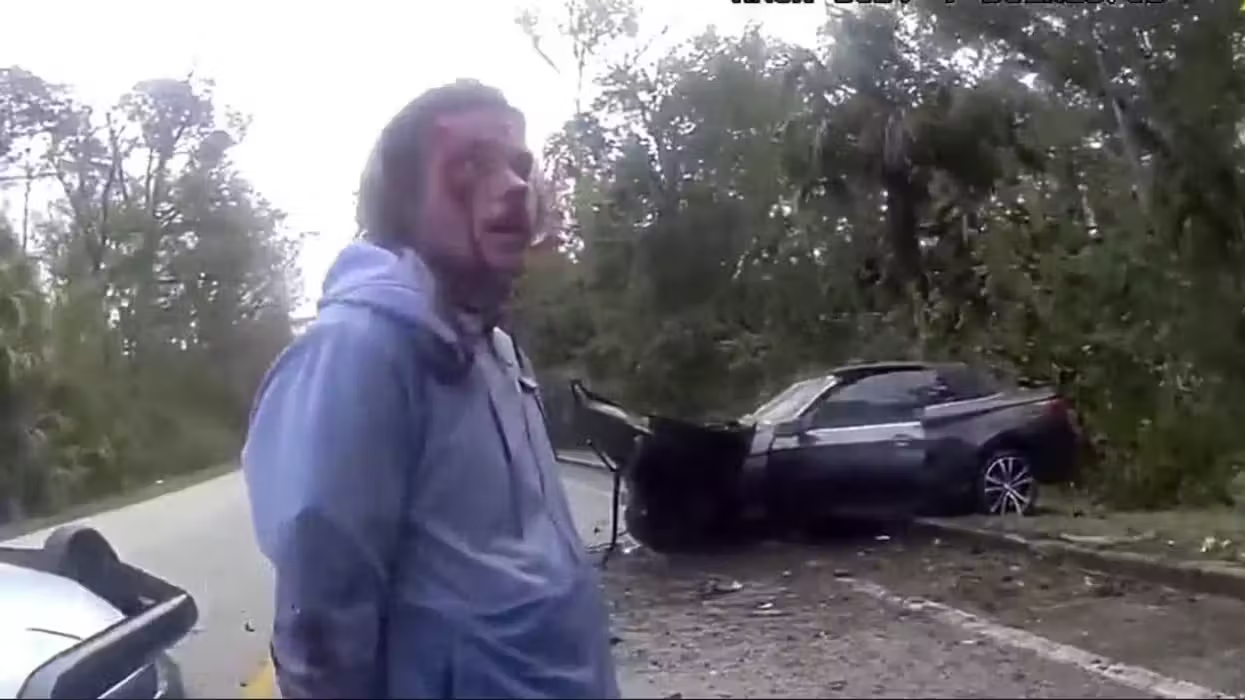
© 2025 Blaze Media LLC. All rights reserved.
"If you're from out of state, they're simply going to find a reason to pull you over."
 A Star Trek fan, two cops, and traffic stop. It isn't a bad joke, but a real-life story that's raising constitutional concerns.
A Star Trek fan, two cops, and traffic stop. It isn't a bad joke, but a real-life story that's raising constitutional concerns.
Two Ohioans recently driving home from a StarTrek exhibit in St. Louis through Illinois were pulled over by a local police officer. They weren't speeding though, according to the Collinsville officer. He pulled them over for allegedly weaving. The events that transpired during that traffic stop -- video and audio were captured by the cop car and posted on YouTube by Terrance Huff who was driving the PT cruiser -- have called up questions of constitutional rights and the boundaries of law enforcement. Here's the video with some voice-over and analysis by Huff (Note: Some strong language):
In the video, Huff says he believes officer Reichert is "morally compromised for fabricating a reason to pull me over." Huff doesn't see getting pulled over for crossing a lane line -- something he says he didn't even do -- but deciding in the end to not change lanes as a reason to pull someone over. Huff explains in the video that Reichert took both his and his passenger Jon Seaton's I.D.s to check for warrants. What Reichert did find was that Huff was arrested a while back -- an arrest that should have been expunged from his record after it was court dismissed. The audio picked up in the police cruiser reveals Reichert calling one of the men a "mother f******" -- Huff presumes it was directed at him over Reichert finding his previous arrest. Huff goes on to explain that a second officer was called and video captures Reichert handing Huff a warning while the other officer stands nearby. Huff's voiceover says, "this should have been the end of it. But it wasn't." From there, Reichert asks Huff if there is a reason his friend might have been acting nervous -- Huff doesn't believe Seaton was acting nervous. Then the truth comes out: Reichert reveals they've had a major problem with people running drugs and guns on the highway and he asks if the men had any of this sort of contraband. Huff offers to show Reichert proof they had been at the StarTrek exhibit -- the purpose of their journey -- and shrugs his arms saying, "We're not drug runners. It's my birthday and we were on vacation in St. Louis."  For the next few minutes, Reichert appears to try and get Huff to admit to having some sort of drugs in the car, even saying he "isn't worried" about a "personal amount" of marijuana in the vehicle. Reichert also asks Huff if he would object to a search of the car, to which Huff doesn't submit, but he is reluctantly OK with Reichert letting his K-9 sniff around it. After more discussion that leaves Huff feeling as if he doesn't have much choice in the matter, Huff and Seaton are patted down for weapons and drugs, and Reichert speaks with Seaton privately explaining the situation and saying Huff seemed nervous. The K-9 run around the car occurs around 9:50 in the video, and Huff makes an observation that it seems the dog has been trained to indicate a presence of drugs at the front of the car -- outside of the cruisers' camera view. If this is case, it would give Reichert the opportunity to "manufacture" probably cause and search the vehicle. This is speculation by Huff, but it is what ends up occurring in the video. Reichert searches the vehicle and doesn't find any drugs but does say he found "shake," marijuana residue. The men eventually leave with just a warning for weaving.
For the next few minutes, Reichert appears to try and get Huff to admit to having some sort of drugs in the car, even saying he "isn't worried" about a "personal amount" of marijuana in the vehicle. Reichert also asks Huff if he would object to a search of the car, to which Huff doesn't submit, but he is reluctantly OK with Reichert letting his K-9 sniff around it. After more discussion that leaves Huff feeling as if he doesn't have much choice in the matter, Huff and Seaton are patted down for weapons and drugs, and Reichert speaks with Seaton privately explaining the situation and saying Huff seemed nervous. The K-9 run around the car occurs around 9:50 in the video, and Huff makes an observation that it seems the dog has been trained to indicate a presence of drugs at the front of the car -- outside of the cruisers' camera view. If this is case, it would give Reichert the opportunity to "manufacture" probably cause and search the vehicle. This is speculation by Huff, but it is what ends up occurring in the video. Reichert searches the vehicle and doesn't find any drugs but does say he found "shake," marijuana residue. The men eventually leave with just a warning for weaving.  Huff believes the dog may have been trained to false alert for drugs. He provides an example of a trained dog searching for narcotics without the praise or other audible cues seen in the footage by Reichert and also includes footage of what it looks like for a dog to exhibit false alerts. The Huffington Post, who interviewed Huff, the police department and legal experts about this video, said that it "raises important questionsabout law enforcement and the criminal justice system, including the Fourth and Fifth Amendments, the drug war, profiling and why it's so difficult to take problematic cops out of the police force." In the Huffington Post, Huff poses the question: "If he thought Jon was nervous, and that might indicate drug activity, why did he wait so long to bring it up? And why did he wait until he had basically told me I could go?" Public defense attorney in Madison County John Rekowski is reported as calling this a "common tactic" and even says the handshake is significant here because the officer "thinks he's establishing that everything that happens after the handshake is consensual." So why didn't Reichert let Huff go after issuing the warning and the handshake that Huff thought was the end of it? HuffPost cites the potential for asset forfeiture, which is when property is taken because it is suspected to be tied with illegal activity. It notes that 80 percent of the time, the owner is never charged with a crime but it is their own responsibility to get the property back, which can "sometimes exceed the actual value of the property." HuffPo reports that interstates are prime targets for asset forfeiture. Here's why:
Huff believes the dog may have been trained to false alert for drugs. He provides an example of a trained dog searching for narcotics without the praise or other audible cues seen in the footage by Reichert and also includes footage of what it looks like for a dog to exhibit false alerts. The Huffington Post, who interviewed Huff, the police department and legal experts about this video, said that it "raises important questionsabout law enforcement and the criminal justice system, including the Fourth and Fifth Amendments, the drug war, profiling and why it's so difficult to take problematic cops out of the police force." In the Huffington Post, Huff poses the question: "If he thought Jon was nervous, and that might indicate drug activity, why did he wait so long to bring it up? And why did he wait until he had basically told me I could go?" Public defense attorney in Madison County John Rekowski is reported as calling this a "common tactic" and even says the handshake is significant here because the officer "thinks he's establishing that everything that happens after the handshake is consensual." So why didn't Reichert let Huff go after issuing the warning and the handshake that Huff thought was the end of it? HuffPost cites the potential for asset forfeiture, which is when property is taken because it is suspected to be tied with illegal activity. It notes that 80 percent of the time, the owner is never charged with a crime but it is their own responsibility to get the property back, which can "sometimes exceed the actual value of the property." HuffPo reports that interstates are prime targets for asset forfeiture. Here's why:
Interstates are a particularly rich ground for forfeiture. Law enforcement officials say that's because interstates are ideal for drug running. Critics say it's because police can target out-of-state drivers, who are more likely than local residents to accept a police officer's baseless accusations and turn over their property, rather than refuse and face arrest, multiple returns to the state for court dates and thousands of dollars in legal expenses. Faced with that choice, it isn't difficult to see why innocent people would opt to hand over their cash and head home. "The joke around our office is that all you need for probable cause in Madison County is an Arizona, New Mexico, Texas, or Florida license plate," says Rekowski, the public defender. Collinsville defense attorney Jessica Koester says she's seen the same thing. "If you're from out of state, they're simply going to find a reason to pull you over."
So, what's the incentive for police officers in asset forfeiture? HuffPo reports that in Madison County, police using "constitutionally suspect" tactics to pull over drivers has brought in a significant sum of money, some of which the prosecutors handling these cases benefit from as well:
The Edwardsville Intelligencer reported in 2010 that the Madison County State's Attorney's Office has reaped a half-million dollars from the policy over eight years, which at the prosecutor's take of 10-12 percent suggests a total bounty of $4.5 million to $5 million.
Madison County is by no means the only area to which fingers can be pointed. HuffPo cites several other example, and last year, Mlive reported Genesee County, Mich., had started warning of drug checkpointsthat would stop cars as well. Drug checkpoints have been ruled unconstitutional by the Supreme Court. HuffPo reports legal experts as saying the tactics seen in Madison County -- and elsewhere -- are more common than many may realize:
"When we saw the Huff video in our office, we just laughed," Rekowski says. "Not because it wasn't outrageous. But because it's the kind of thing we see all the time. The stop for a so-called 'inappropriate lane change,' the games they play in the questioning, the claims about nervousness or inappropriate behavior that can't really be contradicted. It's all routine." According to Koester, the defense attorney in private practice, "The dog alert that happens off-camera isn't unusual either. You see that all the time." Koester and Rekowski say the Huff stop has all the markings of a forfeiture fishing expedition. "You see where he asks if [Huff] is carrying large amounts of U.S. currency," Rekowski says. "It's pretty clear what they're after. These kinds of cases put my kids through college." He laughs, then adds, "I'm only half joking."
Former narcotics officer Barry Cooper has also said the search of Huff's car was illegal. He also says he is 100 percent positive the K-9 false alerted. Reichert was not available for comment to the Huffington Post but it does report Collinsville Police Chief Scott Williams saying he doesn't have any reason to distrust his officers. Still, he said that the department will look into the case and any officer found violating civil rights would be fired. Although the roadside incident involving Huff occurred on Dec. 4, 2011, Reichert appears to have a history dating back several years of questionable police work.
Want to leave a tip?
We answer to you. Help keep our content free of advertisers and big tech censorship by leaving a tip today.
Want to join the conversation?
Already a subscriber?
more stories
Sign up for the Blaze newsletter
By signing up, you agree to our Privacy Policy and Terms of Use, and agree to receive content that may sometimes include advertisements. You may opt out at any time.
Related Content
© 2025 Blaze Media LLC. All rights reserved.
Get the stories that matter most delivered directly to your inbox.
By signing up, you agree to our Privacy Policy and Terms of Use, and agree to receive content that may sometimes include advertisements. You may opt out at any time.






